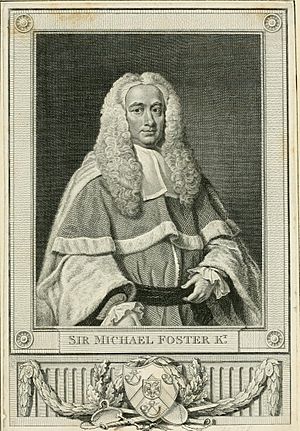Michael Foster (English judge) facts for kids
Sir Michael Foster (born 1689, died 1763) was an important English judge. He was known for being fair and independent in his decisions.
Life and Early Career
Michael Foster was born in Marlborough, Wiltshire, on December 16, 1689. His father was a lawyer. Michael went to the local school and then studied at Exeter College, Oxford. He later became a student at the Middle Temple, which is a place where lawyers are trained. He became a lawyer himself in 1713.
At first, he didn't have much success in London. So, he moved back to Marlborough and then to Bristol. In Bristol, he became a very well-known local lawyer. In 1735, he was chosen to be the Recorder of Bristol. This was an important job where he oversaw legal matters for the city. He held this position for many years. During his time as Recorder, he handled several significant legal cases.
The Broadfoot Case
One famous case Foster handled involved a sailor named Alexander Broadfoot. Broadfoot was accused of causing the death of Cornelius Calahan, a sailor who was trying to force Broadfoot to join the Royal Navy. This practice was called "impressment," where men were forced into naval service.
Judge Foster carefully considered the case. He believed that the King had the right to impress sailors for public service. However, he also found that Calahan had acted without proper legal papers. Because of this, Foster told the jury to find Broadfoot guilty of "manslaughter" (causing a death without planning it) instead of a more serious charge. This decision showed Foster's careful approach to the law.
A Respected Judge
In 1745, Michael Foster was appointed as a judge in the King's Bench. This was a very high court in England. He was also given the title of "Sir." For eighteen years, he served as a judge in this court. He earned a strong reputation for his deep knowledge of the law and for being fair and independent in his judgments.
Other important legal figures praised him highly. For example, Lord Chief Justice De Grey said that Foster was like the "Magna Charta of liberty," meaning he protected people's freedoms. Another famous lawyer, Sir William Blackstone, called him a "great master of the crown law." Even a poet named Churchill wrote that Foster was "just," meaning fair and honest.
Later Life and Family
Sir Michael Foster passed away on November 7, 1763, at the age of 74. He was buried in the church at Stanton Drew in Somersetshire. A monument was built there to remember him.
In 1725, he married Martha Lyde. She died in 1758. They did not have any children.
Works
Sir Michael Foster wrote several important legal books and papers during his career. These works helped to explain and shape the understanding of English law.
- A Letter of Advice to Protestant Dissenters, 1720.
- An Examination of the Scheme of Church Power laid down in the Codex Juris Ecclesiastici Anglicani, 1735.
- The Case of the King against Alexander Broadfoot, 1758.
- A Report of some Proceedings on the Commission of Oyer and Terminer and Gaol Delivery for the Trial of the Rebels in the year 1746 in the County of Surry, and of other Crown Cases, 1762.
 | Mary Eliza Mahoney |
 | Susie King Taylor |
 | Ida Gray |
 | Eliza Ann Grier |


